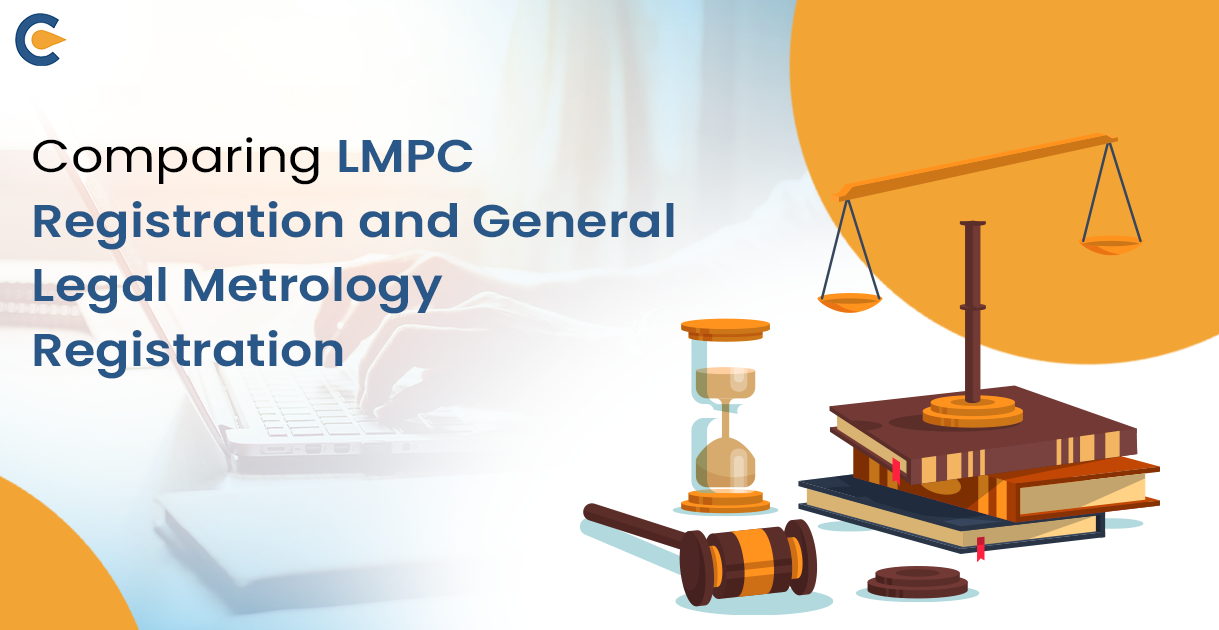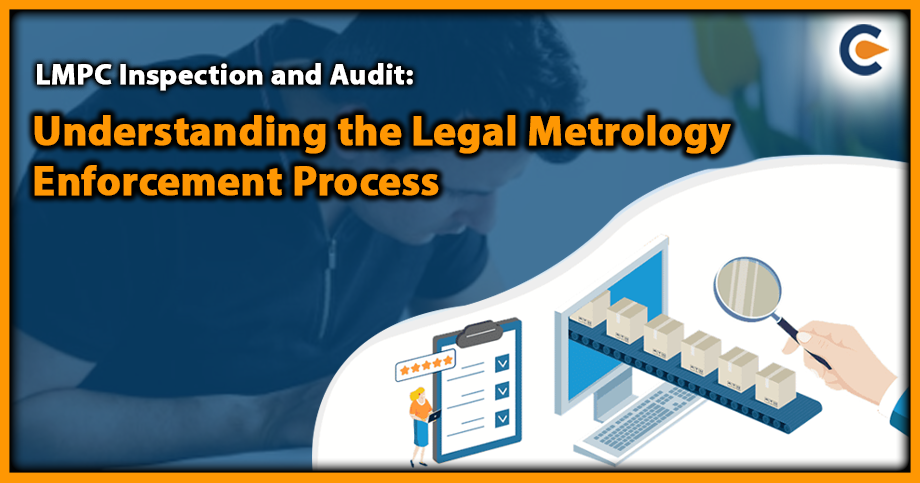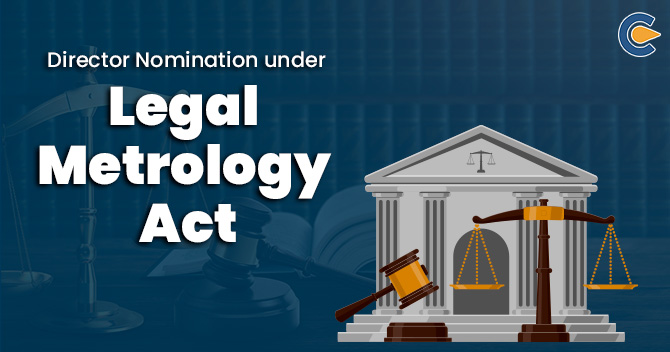Weights and measures have been used since ancient times, and as we all know, they have been highly significant in helping industries, government merchants, and regular consumers determine choices on the basis of measurement results. We often take measurements for granted and may not give them much thought because they are such an integral part of our daily life. For example, in order to ride safely and reduce traffic accidents, we monitor the speed at which we travel. We are put through medical testing to make sure we stay safe. We utilize the time to locate ourselves using satellite positioning devices and schedule appointments on time. We buy meat, fish, vegetables, and fruit by quantity; we fill our cars with gasoline based on volume; we use petrol, electricity, and water that are measured out; and we get our automobiles tested to check exhaust emissions.
What is LMPC Registration?
The Indian legislation known as Legal Metrology Pre-Packed Commodity Registration has been shortened to LMPC. LMPC Registration Certificate is required before importing, especially when the items are pre-packaged or coming from India. The regulation states that u/s 27 of the Department of Consumer Affairs‘ LMPC regulations. It is necessary to apply for the LMPC registration within three months of the import date. However, it is customary to prevent you from removing your products from custom houses until your LMPC Certificate has been submitted. An LMPC certificate must be obtained by importers. Your items will be detained by the Customs Department if you fail to get one or if you do not follow the declaration standards.
What is General Legal Metrology Registration?
- A legal metrology certificate is an official document that certifies that a measuring device or packaged good satisfies legal metrology criteria.
- It is issued through a government-authorized entity.
- The rules and guidelines known as legal metrology requirements are put in place to guarantee the precision and equity of measurements and transactions.
- A certificate of registration or legal metrology license from the Department of Legal Metrology is required for importers, makers, or packers of weighing and measuring items, such as thermometers and weight machines.
Comparing LMPC Registration and General Legal Metrology Registration
Eligibility Criteria for LMPC Registration and General Legal Metrology Registration
| LMPC Registration | General Legal Metrology Registration |
| · A packed Commodity Registration is necessary for producers, packers, and importers who deal in the sale, transportation, and distribution of commodities that have already been packed. · Goods must be handled genuinely, precisely, and according to the right measures in order to receive an LMPC license. . Packers importing items weighing 10 grams/millilitre or less or agricultural products weighing more than 50 kilograms are exempt from needing an LMPC certificate. | · A Real Manufacturing Facility (Physical location) · A certificate of model approval issued by the Director of Legal Metrology for every kind of weight or measure produced · The manufacturing area needs to have the required minimum amount of space. · Unless an exemption applies, the premises must be on the ground level or basement. · Make sure you have all the tools, machinery, and testing supplies needed to produce the desired goods. . Make sure your staff is competent and knowledgeable in the area. |
Essential documents for LMPC Registration and General Legal Metrology Registration
The table below shows the documents that are crucial at the time of LMPC registration and the general legal metrology registration process:
| LMPC Registration | General Legal Metrology Registration |
| · Certificate of Goods and Services Tax · Certificate of Import and Export Code · The MSME Certification · The owners’ and the company’s Pan Card · The applicant’s Aadhar card · If the office is located in a rented space, the rent agreement . Manufacturer’s Name, Address, Phone Number, and Email ID. | · Documents of Incorporation of the company · Professional Tax Certificate, if necessary: · GST Registration Certificate · Labour Permit · PAN card of the business · Identity and Experience Documents of the Promoter · Ownership Documents for Premises and NOC · Evidence of acquiring equipment and supplies for the workshop. · Product Details · Financial documents · Trademark Registration Certificate · The manufacturing premises’ site plan . Evidence of the installed and approved power load |
Registration Process for LMPC Registration and General Legal Metrology Registration
| LMPC Registration | General Legal Metrology Registration |
| Step 1: Send the application to the Metrology Director You need to fill out an application form to apply online for an LMPC import license. The application must be turned in to your local government unit’s director of metrology. The Metrology Council website has the contact details for the director of metrology. Step 2: Send in the paperwork needed to register an LMPC A copy of your business permit and a copy of your current merchant or shop owner license are required if you are seeking an LMPC certificate. Together with any other documentation the Director of Metrology may want, you will also have to provide proof that you have paid all appropriate city and provincial taxes for the last two years. Step 3: Pay the registration costs for the LMPC Your LMPC certificate should arrive in 7 to 10 working days after you’ve sent in the necessary paperwork and paid the necessary fees (depending on when your application is accepted). Step 4: Issuance of the certificate If the application is approved by the authorities, then the LMPC certificate is granted to the applicant. | Step 1: Get the application form. Go to the official website of the Legal Metrology Department in your state to access and download the application for a Manufacturer License in Legal Metrology. Make sure you get the most recent version of the form since this is your one-stop shop for licensing needs. Step 2: Fill out the application. Complete the application according to the given instructions and affix the necessary documentation. For the first license, the LM-I form can be utilized. On the other hand, you can utilize the LM2 form to renew a license that has expired. Step 3: Submitting and Paying the Fee After completing your application, you may submit it by paying the required application cost. The authorities will review the paperwork and documentation that have been submitted before moving on to the subsequent stage. Step 4: Examining and Confirming The department will dispatch representatives to examine the applicant’s company’s manufacturing facilities prior to granting the license. This is done to make sure that all the specified standards are reached and that all Legal Metrology laws are prepared. Step 5: Issuing Licenses The Manufacturer License under the Legal Metrology Act will be issued by the Legal Metrology Department if the firm satisfies all the conditions. The Form-LM-3 is used to grant the license. |
Registration Validity for LMPC Registration and General Legal Metrology Registration
| LMPC Registration | General Legal Metrology Registration |
| . The LMPC certificate is valid for five years. In order to prevent any issues during the customs clearance process, the certificate must be updated prior to its five-year expiration date. | · A legal metrology manufacturing license normally has a one-year minimum validity duration after it is granted. · They may, however, be extended for a maximum of five years. · The renewal application must be submitted at least thirty days prior to the expiration date. · The Controller or another approved individual is in charge of the procedure, which is carried out using the LM-2 form. . Schedule IV of the Legal Metrology Act specifies the relevant renewal charge. |
Conclusion
Serving a multitude of essential purposes, the Legal Metrology Packaged Commodities Certificate and the General Legal Metrology Registration are essential components of India’s legal metrology framework. In addition to many other advantages to the economy and society, it protects consumer rights, encourages fair trade practices, guarantees product quality, and maintains national and international standards. The importance of the Legal Metrology Packaged Commodities Certificate cannot be emphasized as India’s economy develops and grows.
Frequently Asked Questions
Before producing or importing, every importer or producer of items sold by weight, measure, or number must have the appropriate authorities’ authorization for the weight or measure model.
Items intended for institutional or industrial customers- those who purchase items directly from manufacturers for use in their respective industries or institutions that make direct purchases from manufacturers- would be exempt from these regulations.
All importers of pre-packaged goods are required to get an LMPC certificate in accordance with the 2009 Legal Metrology Act and the 2011 Legal Metrology Rules for Packaged Goods. It makes imports easier and provides clarity on all the information related to the goods.
An instrument or pre-packaged commodity imported into a nation is certified to comply with national legal metrology norms and laws by means of a Legal Metrology Certificate.
The Legal Metrology Act aids in tracking and mitigating the negative effects of inaccurate weight and measurement systems. With the goal of guaranteeing public assurance regarding the accuracy and security of the weights and measures, it precisely describes weighing and measuring equipment, units, standards, and essential requirements.
Indeed, there are exclusions for packages weighing more than 25 kg or 25 litres, for specific categories (such as fertilizer and cement) that are offered in bags weighing more than 50 kg, and for products intended for institutional or industrial users.
Applying for an LMPC certificate can be done online via the state-specific webpage. An importer, producer, or packer must submit a modest fee of ₹500 to complete the LMPC procedure. The registration authority examines all of the supporting documentation and your application when it is submitted.
The Legal Metrology Packaged Goods certificate, or LMPC certificate, is a requirement for all companies that produce, distribute, sell, package, import, or manufacture pre-packaged goods.
Any transaction, trade, or contract pertaining to any products, class of goods, or undertakings formed by such weight, measure, or number is subject to the Legal Metrology Act.
All packaged commodities, such as food, drinks, medications, cosmetics, and other consumer items, are subject to Rule 27. It is crucial to remember that any product that is enclosed in a container or covering falls within the Legal Metrology Act’s very wide definition of a packaged commodity.
The modification of the “Legal Metrology (Packaged Commodities) (Amendment )Rules, 2023” aims to guarantee an educated customer experience by means of more precise measurement and labelling of packaged commodities in India.
A legal metrology certificate is a document that certifies that a measuring device or packaged item conforms to legal metrology regulations. It is issued by a government-authorized entity.
Legal metrology is the branch of metrology that deals with weight and measurement units, procedures, and tools that must adhere to certain legal and technological standards in order to guarantee the public’s confidence in the precision and security of the weights and measures.
In order to protect consumer interests, advance fair trade practices, stop fraud, and ensure the accuracy of weights and measures used in business transactions, weights and measurements must be periodically verified.
It is indeed within your rights to challenge the suspension of your Manufacturer License for Legal Metrology, and you have the means to do so.
If you neglect to renew your license on schedule, your manufacturing operations can be deemed unlawful, perhaps resulting in fines and legal ramifications. The renewal application must be filed well in advance of the license’s expiration date.
Depending on the kind of weight or measure, different weights and measures require different stamping and verification frequencies. Certain goods, for instance, could need to be verified every 24 months, while others might have a 60-month verification term. In the applicable legal metrology rule, the precise intervals are described.
If there are good reasons to suspect that a licensee gave false information or disregarded any laws, regulations, or directives, the Controller or an authorized official may suspend or revoke the license.
Legal Metrology Manufacturer Licenses cannot be sold or transferred. They are given to designated organizations and cannot be sold or transferred to another organization.
Companies that manufacture weights and measures in India are required to get a Legal Metrology Manufacturer License. The Legal Metrology Act, which governs the use of weights and measures in business operations, requires it. This license lowers trade obstacles, builds confidence, assures legal compliance, and generates cash for the government.
Yes, a number of requirements must be fulfilled for these permits to remain valid. These include keeping records and registers, realizing that licenses are non-transferable, showing the license at the company location, and following the criteria for routine verification and inspection.
Read Our Article: Key Components of LMPC License Application and Documentation











